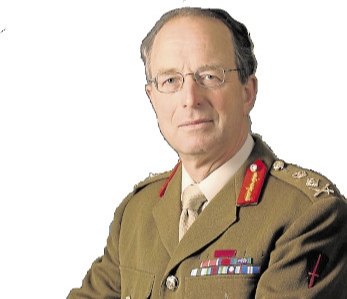Ukraine should negotiate an end to its war with Russia, and be prepared to trade ‘peace for land’.
That’s the view of one of Britain’s most senior retired military leaders, a former chief of the defence staff, general David Julian Richards (lord Richards), expressed in a surprising interview with the BBC on 20 February.
Richards follows in the footsteps of US general Mark Milley, who publicly and repeatedly argued along similar lines while still the head of the US armed forces (chair of the US joint chiefs of staff) in November 2022 (PN 2665).
‘When there’s an opportunity to negotiate, when peace can be achieved, seize it. Seize the moment,’ general Milley said on 9 November 2022, speaking to the Economic Club of New York about Ukraine. He also spoke out publicly on 10 and 16 November. Milley was reported to have referred in top-level meetings to the example of the First World War, ‘when the two sides engaged in years of trench warfare with little change in territory but millions of pointless casualties.’
Today, the war has, as Milley predicted, bogged down into a stalemate. Ukraine’s top general, general Valerii Zaluzhnyi, admitted as much in December, telling the Economist: ‘Just like in the First World War we have reached the level of technology that puts us into a stalemate.’ (Zaluzhnyi was sacked as head of the Ukrainian armed forces within weeks.)
What is ‘victory’?
Coming back to the UK, David Richards was head of the British armed forces (chief of the defence staff) from 2010 to 2013. (In retirement, Richards was put into the House of Lords in 2014.)
Richards was interviewed on Radio 4’s PM programme on 20 February.
Presenter Evan Davis asked Richards what ‘victory’ in the war might mean for Ukraine. Richards responded by outlining different ways that the war might develop, including Russian victory over the whole of Ukraine (not possible, in his view) and Ukraine retaking all of its territory from Russia (not feasible).
“We are asking very brave Ukrainians to fight a war which we’re not resourcing them to win – we haven’t even defined victory – and that they’re unlikely to succeed in, and therefore there is a growing case for saying we need to negotiate with Russia”
Richards said the most likely outcome was that the war would ‘rumble on, very destabilising to the rest of Europe, economically sapping, huge casualty figures for both sides – but the Ukrainians have got a much smaller population – and that is something that we shouldn’t tolerate.’
Richards criticised the West for not saying what ‘victory’ could mean for the Ukrainians in this war: ‘No one has defined what it is that we wish them [to achieve] or hope that they will achieve.’
Back in June 2022, Richards had criticised Western policy towards Ukraine as ‘a “let’s see how it goes” “strategy”, in other words not really strategy at all’.
We need to negotiate
Returning to the PM interview in February, Richards said: ‘at the moment, we are asking very brave Ukrainians, and the population as a whole, to fight a war which we’re not resourcing them to win – we haven’t even defined victory – and that they’re unlikely to succeed in, and therefore there is a growing case for saying we need to negotiate with Russia.’
Richards argued that Ukraine should negotiate a compromise to end the war. Ukraine should ‘trade peace for land, in some way’, giving up its claim to some or all of the territory currently held by Russia.
Richards described this as ‘the most likely option’.
He suggested one way to spin this retreat from Ukraine’s current war goals: ‘you can represent it, I think, as a Russian strategic failure while they [the Ukrainians] have gained some ground’, retaking land captured by Russia in early 2022.
Richards condemned the current Western policy of not giving Ukraine the weapons and the ‘operational freedom’ to strike Russia hard, while also admitting that striking Russia hard could lead to ‘escalation’, a word which means, in the end, risking nuclear war.
Neither the current level of Western support nor a ‘strike Russia hard’ policy would be helpful for Ukraine or for the international community, said Richards: ‘none of that is any good for any of us and in the meanwhile a lot of good people are dying.’
Richards added: ‘I’ve seen a bit of war, and you’re seeing it play out again in Gaza. War is the very last resort and we seem to too often treat it as the first resort and we’ve got to get back to diplomacy and seek some sort of resolution to it.’
Incidentally, we have not found any reporting of this interview, or of Richards’s call for negotiations, in any British newspaper, or even on the BBC News website.


